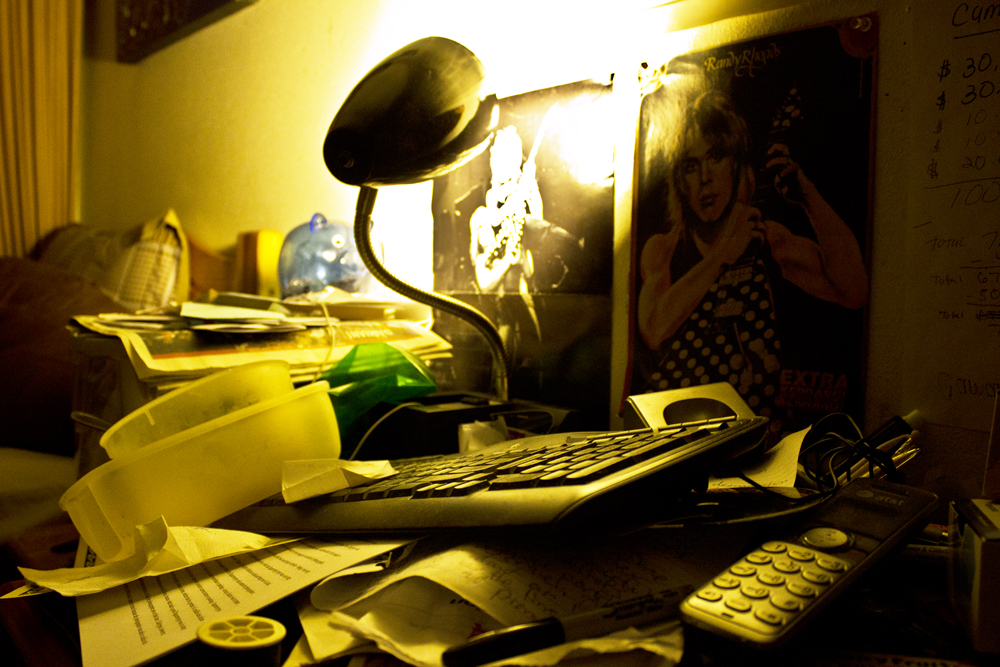As a student, few things are as frustrating as being in a hurry and having an assortment of assignment-related mishaps occur minutes before you have to dash to class.
First, the printer jams. Next, you don’t have the faintest idea where to scrounge up a stapler or paperclip, and this professor stated clearly in the syllabus that loose pages folded together would not be accepted.
You poke around through the clutter and you feel it tucked behind a biology textbook from last term and beneath the sweater you wore three days ago. Ah, saved by the stapler!
Crisis averted—temporarily. Those of us who struggle to keep our work space organized and functional are all too familiar with this scenario. Every once in a while we get inspired and get out the recycle bin to do some serious cleaning, but it never lasts.
It’s just so easy to come home at the end of a day and dump everything on the desk—but think of how empowered and optimistic you feel for the first few days after you purge all the clutter in your area.
The best, and most terrifying, way to make your space usable is to completely start over. Tell yourself that you’re going to dedicate a few hours to getting your area organized once and for all.
Unfortunately, this means removing everything from the drawers and surface and doing some extensive sorting. Start making floor piles and you’ll realize quickly how little of this stuff you actually need or use frequently enough to merit precious desk space.
Clear the surface of miscellaneous doodads. Try to keep drawers organized by contents.
Don’t go on a half-hearted cleaning spree and stuff everything into whichever drawer it can be shoved into. You can repurpose different sized food jars to sort everything from writing materials to paperclips.
Utilize organizers and keep the desktop accessories to a minimum. That means the oversized desk calendar you bought last year (which you were definitely going to use this time) has got to go.
People underestimate the convenience of having a trash can near the work area, ideally within reach. It generally doesn’t need to be emptied that frequently, and it saves many headaches in the long run. Even just having a paper bag handy for recyclables can help keep your desk feeling spacious. A good rule of thumb for papers is: When in doubt, throw it out.
Those to-do lists on scraps of paper and sticky notes fluttering around aren’t doing anything more than reminding you to clean your desk. Start keeping a notebook to write notes-to-self, either a small one you carry around throughout the day or one that stays open at your desk for you to jot on as inspiration hits.
This could also take the form of a whiteboard hung on the wall over your desk. Ditching the scraps will make a huge difference in the long-term and make finding all of your to-dos a lot easier.
After the big purge, the key to keeping it clean is regular upkeep. Ellie Buckner, a student at Portland Community College, said she’s always had a hard time keeping her desk organized until recently, when she finally started to take the advice her mother has been touting for years.
“My mom always told me to clean up as I go, so a little every day. Working at my desk has been way less daunting to me knowing I don’t have weeks worth of coffee cups and class readings scattered all over it,” she said.
For Buckner, the perks of organization have been well worth the effort.
“I’ve always had a desk, but I used to do most of my work on the couch. It might seem weird, but I’m a lot more motivated now to do homework. It’s definitely helped my procrastination,” Buckner said.
Imagine no longer having to scramble to get out the door on time because you can’t find your keys. Without the mountains of rubbish on your desk, they’re easily found! Given that so much of our time is spent studying, it makes sense that our work space can inspire creativity or completely overwhelm us.
A little effort here can overlap into other areas of our lives. The reward for this minimal maintenance is increased productivity and sparing yourself many last-minute meltdowns.





